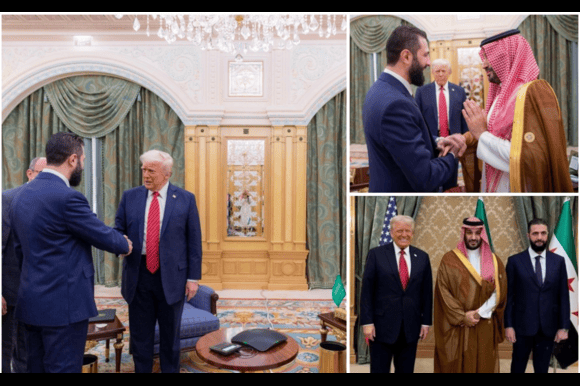In a landmark encounter, US President Donald Trump met with Syria’s interim President Ahmad al-Sharaa on Wednesday in Saudi Arabia — marking the first direct engagement between American and Syrian leaders in a quarter of a century, according to the Associated Press. The meeting took place on the sidelines of Trump’s broader consultations with Gulf Cooperation Council (GCC) leaders during his ongoing regional tour.
This unprecedented dialogue signals a notable shift in Washington’s stance on Syria, a country still reeling from decades of autocratic governance under the Assad family and the profound devastation caused by a prolonged civil war.
Following the meeting, White House Press Secretary Karoline Leavitt announced that President Trump had encouraged the Syrian leader to endorse the Abraham Accords with Israel and to remove all foreign terrorist elements from Syrian territory. In a post on X, Leavitt detailed that Trump had also urged Al-Sharaa to deport Palestinian terrorists, take steps to prevent a resurgence of ISIS, and take full responsibility for managing ISIS detention facilities located in Northeast Syria. “President Trump encouraged President Al-Sharaa to do a great job for the Syrian people,” she wrote.
From Extremist Background to Presidential Authority
Ahmad al-Sharaa, formerly known by his alias Abu Mohammed al-Golani, has a controversial past marked by his involvement with al-Qaida and participation in the Iraqi insurgency against US troops. His ascent to Syria’s interim presidency in January followed a surprising military campaign by his faction, Hayat Tahrir al-Sham (HTS), which succeeded in capturing Damascus and toppling the Assad regime’s 54-year rule. Despite now holding the presidency, al-Sharaa remains listed as a terrorist by the US government. Since his rise to power, Washington has been carefully reassessing its policy and position toward Syria’s new leadership.
Trump Announces Plans to Lift Sanctions
Ahead of the high-level meeting, President Trump declared his intention to remove longstanding US economic sanctions on Syria. These sanctions, initially imposed in 1979 due to Syria’s classification as a state sponsor of terrorism, have taken a heavy toll on the nation’s economy — a strain exacerbated by the outbreak of civil war in 2011.
“Syria deserves a chance at peace under al-Sharaa,” Trump stated, signaling a potential normalization of relations and a readiness to reengage with Damascus after years of diplomatic estrangement.
Tight-Lipped on Specifics
The meeting was conducted behind closed doors, with no media access permitted. The White House has not disclosed the list of attendees or the full scope of issues discussed. Prior to the event, US officials had suggested that the encounter would be brief, with expectations that Trump would offer only a cursory greeting to the Syrian leader.
Regional Implications and Reactions
In the broader Middle East context, several Gulf nations have expressed support for Syria’s new administration, viewing it as a strategic counterbalance to Iran’s regional influence — particularly in light of Tehran’s longstanding support for the Assad regime throughout the Syrian conflict.
Israel, however, has voiced serious concerns about al-Sharaa’s history of militancy, warning the United States against legitimizing a figure with such a background. Trump acknowledged that his decision to meet al-Sharaa was significantly influenced by Saudi Crown Prince Mohammed bin Salman, who played a key advisory role.
Ahmad al-Sharaa is the first Syrian head of state to meet a sitting US president since Hafez al-Assad’s 2000 summit with Bill Clinton in Geneva. This latest engagement in Riyadh is being widely interpreted as a major diplomatic breakthrough, as Syria attempts to rejoin the international fold after years of war and isolation.
Syria’s Foreign Ministry described the lifting of sanctions as a “pivotal turning point” in the nation’s ongoing recovery efforts. In a statement released Tuesday night, the ministry clarified that the punitive measures were tied to the Assad regime’s human rights abuses and not reflective of the present interim leadership.
“The removal of these sanctions offers a vital opportunity for Syria to pursue stability, self-sufficiency, and meaningful national reconstruction, led by and for the Syrian people,” the statement concluded.






